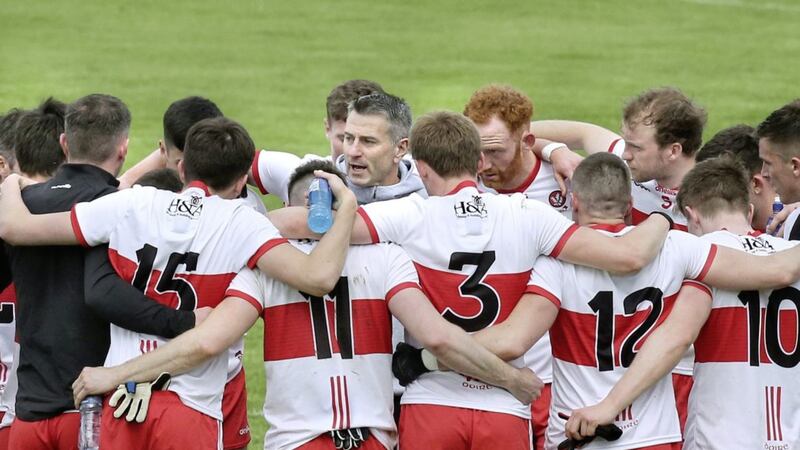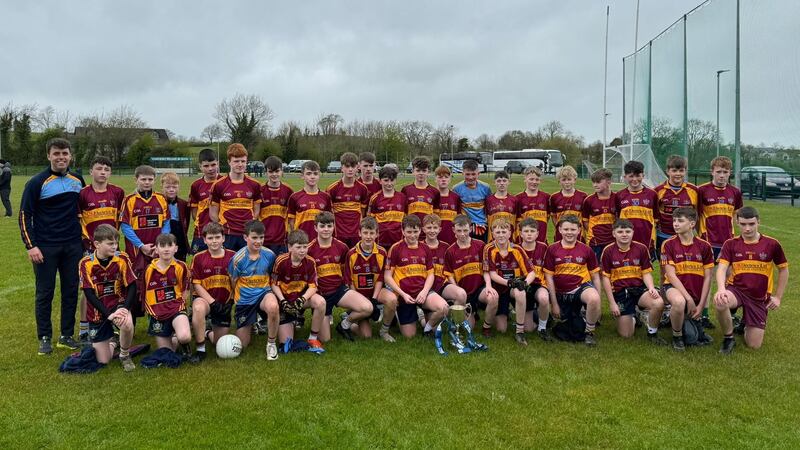ON some level, people tend to care what others think of them. It’s human nature to want to be liked.
Rory Gallagher doesn’t suffer such an affliction when it comes to football.
He is the obsessively driven type that is attracted to inter-county management. The type who has six weeks of the year where he bothers with his friends.
“My friends would tell me I’m very selfish when I’m involved in football, I don’t bother about them. They know that,” he said before Fermanagh’s Ulster final in 2018.
Gallagher is an unerringly straight shooter. Blunt.
That makes him a divisive character.
People tend not to care for being told the truth all that much.
Taking his native Fermanagh to that decider three years ago was a significant achievement - but to come within a final-day defeat of promotion to Division One with a team that had to work as hard for their scores was more impressive.
They played above themselves under him. They were able to because they unwaveringly believed in what they were doing.
Under Rory Gallagher, Fermanagh had a gameplan that was horrendous to look at. It reminded me of my first car, an old Peugeot 306. I would have described the colour was ‘boke grey’.
Fermanagh played boke grey football during his two years.
But like the old 306, it was functional, it took you where you wanted to go, and that was all you could really expect of it.
The problem with relying so heavily on ingrained defensiveness is when it goes wrong. It’s not designed for game-chasing.
The 2018 Ulster final could not have gone any worse. Ryan McHugh had two goals buried before Arlene Foster had worked out who the Fermanagh sweeper was meant to be.
From there, the limitations were obvious. Gallagher’s typical approach to the sideline is to kick every ball. Loudly.
That afternoon, he barely spat on his hands for the last 45 minutes.
He has learned a lot about management since he worked under Jim McGuinness a decade ago.
The pair of them successfully rotated good cop, bad cop until their relationship broke down in 2013 and led to Gallagher leaving the management at the end of that season.
While McGuinness was hands-on in terms of the coaching, Gallagher excelled in terms of his knowledge of the game and other teams. The defensive match-ups, which they rarely ever got wrong, were largely down to him.
It said a fair bit about how the Donegal players viewed him that when McGuinness left, they made it very clear behind the scenes that Gallagher was the man they wanted to take over.
They got their way but found, as he did, that coaching and management were two very different things.
His solo tenure would not be remembered with huge fondness by Donegal fans, who had the knives out for him by the time he left after the hammering by Galway in 2017.
He was ultimately presiding over the break-up of a team that had exhausted itself.
Gallagher was steadfast in his commitment to youth during that time. Donegal’s success since 2018 might not have occurred under him, but it was at the very least expedited by him.
His directness, bluntness, spikiness, whatever you want to call it, is a huge part of why he has Derry firing on all cylinders.
The job was taken amid a hail of bullets. Derry clubs weren’t happy with the process but in some corners that argument was a front for the fear that he’d have them playing 15 men behind the ball.
Any man would have wavered. Gallagher might have too, but had the courage of his convictions and went ahead despite the boardroom acrimony.
The following month, November 2019, Derry trained on 27 days out of 31. That was only partly about the physical aspect, and a lot about the mental.
Gallagher was saying to his players ‘this is what it takes if you’re serious’.
The Derry players maybe didn’t realise it at the time, but they’d been soft-soaped before he came in.
When they played Donegal in their second McKenna Cup game on a Wednesday night in Celtic Park, they were beaten by a second-string since. Gallagher pulled no punches, publically or privately.
He took an early slap at the “culture” within the Derry setup, complaining about the players dripping and drabbing in, not being at the ground on time, while Donegal came early as a unit.
There were senior players unavailable that night who watched the game from the stand in club gear, and Gallagher reportedly cut through them for not setting the same example that Michael Murphy did by being in the Donegal changing room in his county colours and setting the tone for a game he wasn’t playing in.
High standards have been demanded since. Derry have come on leaps and bounds physically, which has been evident in their performances so far this year.
Against Armagh in the championship last year, they played such an exposed game defensively that at one stage, Bliain Hughes almost put Jamie Clarke in on goal from an Armagh kickout.
Nothing has changed in the first two weeks of 2021. They have the best defensive record in Ireland and they have it because they haven’t given Longford or Fermanagh any ball to play with.
Derry have hounded the opposition kickout and demanded that their forwards tackle high up the pitch. They took Fermanagh’s invitation of a sweeper on Saturday but when it came to restarts, nothing was allowed out soft.
That has allowed a platform to build around Conor Glass and Emmett Bradley in midfield.
Having seen the job he did on Rian O’Neill last year, Gallagher has also moved Chrissy McKaigue into a man-marking role in the full-back line.
McKaigue is superb at that but it was evident last year than when he was tied up, Derry missed his presence on the ball.
Gareth McKinless has come into the team and from centre-back, he not only gives them natural defensive ability but a serious drive and pace and directness that opposition teams will not enjoy facing.
It’s far from a finished article. Presuming at this stage that Donegal beat Down, Derry probably won’t win in Ballybofey, because it’s Ballybofey and Donegal are still the best side in Ulster.
Derry aren’t at that level yet. But for the first time in a generation, they appear to be headed that way.
They’re a fresh, fit, vibrant team with a couple of handy scoring forwards, a handful of man-markers, a real presence in goalkeeper Odhran Lynch and a first natural midfielder for years in Conor Glass.
Any fears over the style the manager would have them playing have proven completely unfounded.
It’s easy to throw mud at him and make it stick. The defensive label might never truly leave him.
But anyone who wants to examine the thing properly could only see that Rory Gallagher has moved on, and Derry have moved on because of him.







